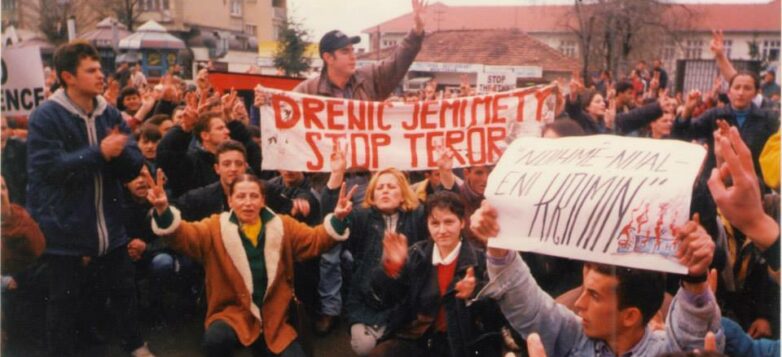Öğrencilerimle konuşurken hep birlikte okulumuzu [Xhevdet Doda] açmayı uygun gördük ve karar verdik ama bunu yapmamız başlı başına karakteristik bir hareketti, okulun iki yanında, iki kanadında da {parmaklarıyla gösteriyor} iki tank vardı. Bnları konuşurken, okulun kapısını, ana girişini açarsak, bizi göreceklerine, durduracaklarına ve bununla bir şey elde edemeyeceğimize karar verdik ve ardından şiddet, bize yönelik baskı [olacaktı]
Ben de, ‘Biliyor musunuz? Okulu başka bir taraftan da açabiliriz’ dedim, zaten burada uzun süre çalıştığım için okulu çok iyi biliyordum. ‘Burası eski bir bina olduğu için, bazı pencere parmaklıkları var, ama belki de bu parmaklıklar, belki birlikte bu parmaklıkları çıkarıp içeri girebiliriz…’ dedim, bahsettiğim bodrumdaki pencereydi, bodrum katının banyolarından biri {eli ile göstererek anlatıyor}. Biz de o 17 öğrenciyle oraya gittik ve açmaya karar verdik.
[…] Onlar bizi durdurmadılar, başkaları da [okulu] açmamızı engellemeye gelmedi. Ve o okulda kaldık. Tabii sonradan okula girip, ‘Nasıl açtınız?” filan diye sordular, ama bizi oradan çıkarmaya çalışmadılar. Belki de nasıl desem, dünyanın önünde “Onlara izin veriyoruz ama istemiyorlar’ diyebilmeleri için bir siyasi manevraydı. ‘İşte açık bir okul var, çünkü onlara izin veriyoruz, onları durdurmuyoruz.’
Ajnishahe Azemi, 1955 yılında Loxhë köyünde doğdu. Priştine Üniversitesi Felsefe Fakültesi’nden mezun oldu. Mezuniyetinin ardından, 1980 yılında Priştine’deki “Xhevdet Doda” Lisesi’nde 2020’de buradan emekli olana kadar öğretmen olarak çalışmaya başladı. Ajnishahe Hanım, kuruluşundan bu yana Kosova Demokratik Birliği ve Kadın Forumu’nun üyesidir. Kendisi 2002’den 2017’ye kadar Priştine Belediye Meclisine danışmanlık yaptı. Aynı zamanda bir aktivist olan Ajnishahe Hanım, halihazırda ailesiyle birlikte Priştine’de yaşamaktadır.
